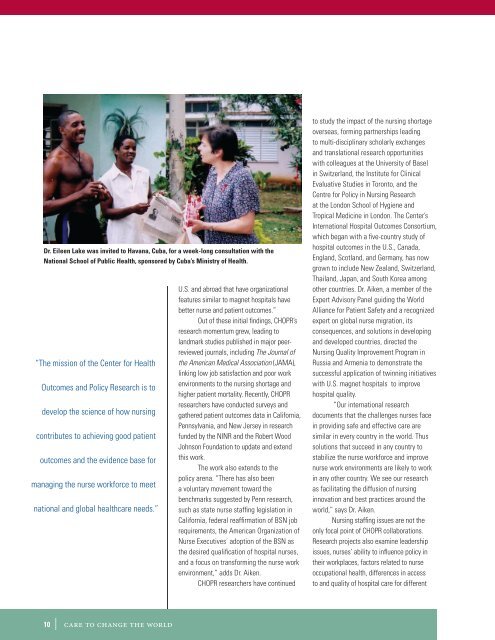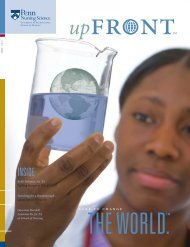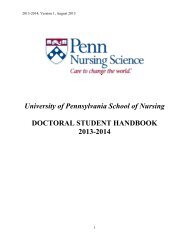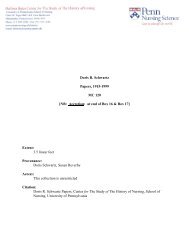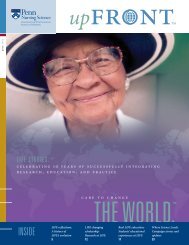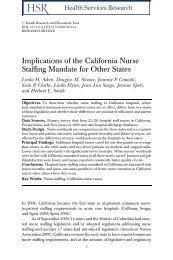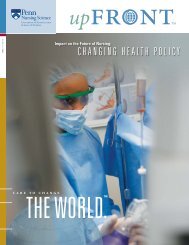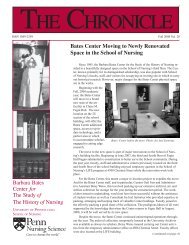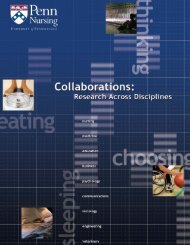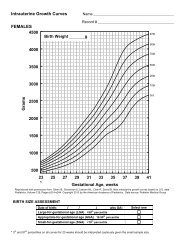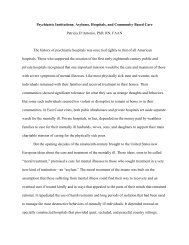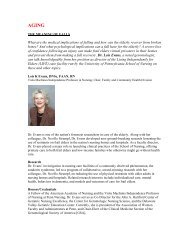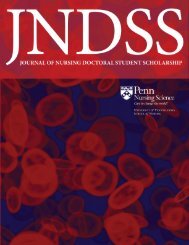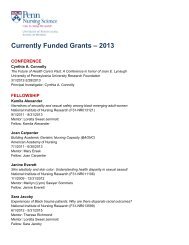Research Centers - University of Pennsylvania School of Nursing
Research Centers - University of Pennsylvania School of Nursing
Research Centers - University of Pennsylvania School of Nursing
Create successful ePaper yourself
Turn your PDF publications into a flip-book with our unique Google optimized e-Paper software.
Dr. Eileen Lake was invited to Havana, Cuba, for a week-long consultation with the<br />
National <strong>School</strong> <strong>of</strong> Public Health, sponsored by Cuba’s Ministry <strong>of</strong> Health.<br />
“The mission <strong>of</strong> the Center for Health<br />
Outcomes and Policy <strong>Research</strong> is to<br />
develop the science <strong>of</strong> how nursing<br />
contributes to achieving good patient<br />
outcomes and the evidence base for<br />
managing the nurse workforce to meet<br />
national and global healthcare needs.”<br />
U.S. and abroad that have organizational<br />
features similar to magnet hospitals have<br />
better nurse and patient outcomes.”<br />
Out <strong>of</strong> these initial findings, CHOPR’s<br />
research momentum grew, leading to<br />
landmark studies published in major peerreviewed<br />
journals, including The Journal <strong>of</strong><br />
the American Medical Association (JAMA),<br />
linking low job satisfaction and poor work<br />
environments to the nursing shortage and<br />
higher patient mortality. Recently, CHOPR<br />
researchers have conducted surveys and<br />
gathered patient outcomes data in California,<br />
<strong>Pennsylvania</strong>, and New Jersey in research<br />
funded by the NINR and the Robert Wood<br />
Johnson Foundation to update and extend<br />
this work.<br />
The work also extends to the<br />
policy arena. “There has also been<br />
a voluntary movement toward the<br />
benchmarks suggested by Penn research,<br />
such as state nurse staffing legislation in<br />
California, federal reaffirmation <strong>of</strong> BSN job<br />
requirements, the American Organization <strong>of</strong><br />
Nurse Executives’ adoption <strong>of</strong> the BSN as<br />
the desired qualification <strong>of</strong> hospital nurses,<br />
and a focus on transforming the nurse work<br />
environment,” adds Dr. Aiken.<br />
CHOPR researchers have continued<br />
to study the impact <strong>of</strong> the nursing shortage<br />
overseas, forming partnerships leading<br />
to multi-disciplinary scholarly exchanges<br />
and translational research opportunities<br />
with colleagues at the <strong>University</strong> <strong>of</strong> Basel<br />
in Switzerland, the Institute for Clinical<br />
Evaluative Studies in Toronto, and the<br />
Centre for Policy in <strong>Nursing</strong> <strong>Research</strong><br />
at the London <strong>School</strong> <strong>of</strong> Hygiene and<br />
Tropical Medicine in London. The Center’s<br />
International Hospital Outcomes Consortium,<br />
which began with a five-country study <strong>of</strong><br />
hospital outcomes in the U.S., Canada,<br />
England, Scotland, and Germany, has now<br />
grown to include New Zealand, Switzerland,<br />
Thailand, Japan, and South Korea among<br />
other countries. Dr. Aiken, a member <strong>of</strong> the<br />
Expert Advisory Panel guiding the World<br />
Alliance for Patient Safety and a recognized<br />
expert on global nurse migration, its<br />
consequences, and solutions in developing<br />
and developed countries, directed the<br />
<strong>Nursing</strong> Quality Improvement Program in<br />
Russia and Armenia to demonstrate the<br />
successful application <strong>of</strong> twinning initiatives<br />
with U.S. magnet hospitals to improve<br />
hospital quality.<br />
“Our international research<br />
documents that the challenges nurses face<br />
in providing safe and effective care are<br />
similar in every country in the world. Thus<br />
solutions that succeed in any country to<br />
stabilize the nurse workforce and improve<br />
nurse work environments are likely to work<br />
in any other country. We see our research<br />
as facilitating the diffusion <strong>of</strong> nursing<br />
innovation and best practices around the<br />
world,” says Dr. Aiken.<br />
<strong>Nursing</strong> staffing issues are not the<br />
only focal point <strong>of</strong> CHOPR collaborations.<br />
<strong>Research</strong> projects also examine leadership<br />
issues, nurses’ ability to influence policy in<br />
their workplaces, factors related to nurse<br />
occupational health, differences in access<br />
to and quality <strong>of</strong> hospital care for different<br />
10 | care to change the world


